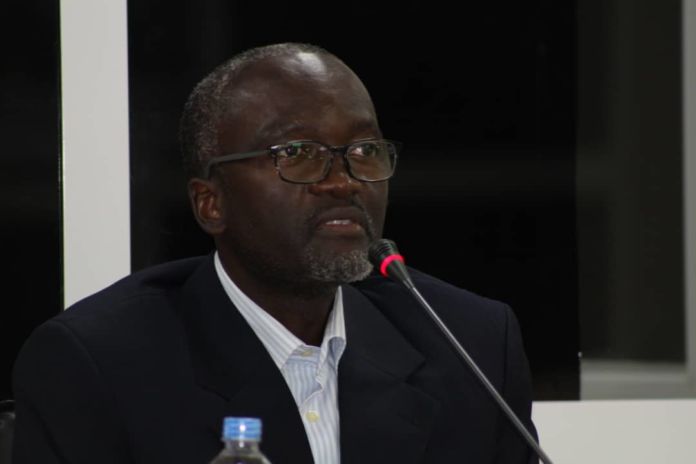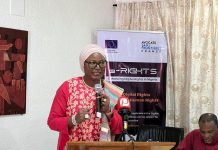By Yankuba Jallow
An ex-Interior Minister during April 2000 mass students’ demonstration has admitted before the TRRC that he lied in a public interview with GRTS about the circumstances of the demonstration.
“I admit that I have lied. I was misled,” he said.
A GRTS video interview was played before the TRRC where he stated the security personnel did not use live bullets, instead the shooting was coming from the side of the students. He added that the security personnel were not having live bullets.
“I was misled and I apologize for not saying the right thing. I regret making such statement,” he said, adding that the actual information he got was the security personnel were shooting the students with live bullets.
He said the information he got from the police was that the students were planning a demonstration because of two reasons; one was about the death of Ebrima Barry allegedly caused by the fire service officers and the alleged rape of a female student.
“According to the IGP and the Chief Fire Officer, they were seriously looking into this issue,” Badjie said.
He said they held a meeting at the Gambia College with the Principal of the College, some students and some community leaders. He said the meeting was to assure the families of the victims that their issue was being critically looked into.
“From my observation, they were in a haste for things to speed up. But this was an administrative issue – things cannot be done the way they wanted because a post-mortem was required,” he said.
He said he told the students that they have a right to demonstrate but it has to be done within the confines of the law because there is a Public Order Act which indicates how demonstrations should be held. He added that they should write to the IGP and they should ensure that they don’t cause traffic jam as a result of their demonstration. He denied speaking to the students aggressively as put forward by some of the witnesses before the Commission (TRRC).
“We told them our reasons of coming and we reassured them that things will be handled but they indicated that they were not happy with the way police were handling the situation and they insisted that they will carry on with their planned demonstration,” the Minister said.
He said the then Students Union President Omar Joof came to his office informing him about his desire to meet him and the IGP to discuss about the death of Ebrima Barry and the alleged rape of Binta Manneh. He said the IGP promised to facilitate their meeting but the meeting was never held.
He said the IGP told him that the students were planning a demonstration on the 10th April 2000. He said on the 9th April 2000, he sent a press release from the ministry which was broadcast on GRTS indicating that the planned demonstration was illegal because a permit was not obtained.
“I did not receive intelligence report from the police,” he said, adding that he was not aware of any security risk assessment being carried out.
He said as the Minister of the Interior, he was responsible for only for policy and the welfare of all those law enforcement officers under the ministry. He added that the internal security matters falled under the responsibility of the Inspector General of Police (IGP) adding that the IGP can report to the Minister of the Interior or the President. He told the Commission that the Police Intervention Unit (PIU) cannot be deployed without the approval of the IGP.
On the 10th April
He said he left home at around 7:30 am and on his way to office, he met students at the GTTI who were chanting “release our leaders” and the traffic was not moving. He added that there were a few police officers who were outnumbered by the students. He said the PIU officers were trying to disperse the students from the road. He said he alighted from his vehicle and went to meet the students.
“They were not violent in anyway,” he said.
He said he asked the students what he can do to avert the situation and the students made two demands. He said the students demanded that they don’t want to see any PIU personnel at GTTI and they also demanded for the release of their leaders. He said five minutes later, he drove to the PIU headquarters to ensure the release of the student leaders. He said at the PIU, he met two PIU officers guarding the detained student leaders and he instructed the release of the student leaders and the orders were executed.
He said after releasing the student leaders, he walked to Westfield because he got information that there was a larger crowd there and his intention was to inform the students that their leaders have been released.
“On that day, I did not speak to the IGP nor any senior security officers,” he said.
He said at Westfield, he met retired Colonel Baboucar Jatta, a former Chief of Staff who facilitated his address to the students. He said he informed the students about the release of their leaders and they were all cheering up.
“As far as I can remember, Westfield was very peaceful,” the witness said.
He said after Westfield, he walked with Baboucar Jatta to Latrikunda where he addressed a group of students. He said while addressing the students, there were some boys who weren’t in uniform throwing stones at himself and Baboucar Jatta. He said he stopped the address and he left Baboucar Jatta with the students.
“At GTTI I found a calm and peaceful crowd but at Lartikunda, the crowd was peaceful in the beginning but there were some people who infiltrated; hostile elements who had a different agenda and that was the reason why I left,” he said.
He said the hostile elements were throwing stones at him and CDS Jatta. He said he went back to Westfield and he met Honourable Halifa Sallah and Sidia Jatta.
“I found the situation at Westfield very calm and I said to myself
‘Alhamdulillah’,” the witness said.
He said at the PIU, he found that the vehicle was smashed and there was no police officer. He said he was given a lift by a person who he couldn’t remember to get to his office in Banjul. He said at his office, he continued with his official work and he did not speak with anyone about the situation then.
“I did not speak to anyone of them. I was expecting the Inspector General of Police to submit or bring a report to me. I did not speak to the Inspector General Police because of the way he acted in an unusual way,” he said, adding that “the least I would have expected from the Inspector General of Police is to come to my office to brief me about what was happening in case the National Assembly calls me for questioning.”
He said he should have also inquired from the police about the situation but he failed in his responsibility. He said he suspected that the IGP and co had information that they didn’t want him to know.
He said the Report of the Commission of Inquiry that was setup to probe into the April 2000 incident have things that he did not say. He was found liable by the Report for whatever happened to the students together with top security officers who were on the ground for the failure in their responsibility to avert the situation.
He advised that the civilians shouldn’t see security personnel as their enemies. He said people should ensure that they always follow the law especially the Public Order Act which provides for obtaining permit before demonstration.
About the witness
Ousman Badjie is a former soldier turned civil servant. He held the rank of 2nd Lieutenant before joining the civil service. In 2007, he was appointed Ambassador to Morocco for five years and in 2012, he was moved to France as the Ambassador until 25th August 2013 when he was recalled and appointed as Minister of Works and Construction until 13th November 2014 when he was relieve of his appointment.
He said he was born on the 2nd August 1967 in Banjul. He joined the Gambia National Gendarmerie on the 2nd August 1988 and later became an instructor at the Turkish Gendarmerie Training School. He said after the 22nd July 1994 coup, he was transferred to the Gambia Police Force as a commissioner of police in charge of operation for only a month and in January 1995 he was arrested. He said he was arrested on the same day with Late Captain Sadibou Hydara and ex-Captain Sanna Sabally, adding that he was arrested by military personnel. He told the Commission that he was held in communicado for a week at the Yundum Barracks. He said after a week’s detention at the military barracks, he and some of his colleague police were transferred to Mile II. He said he was detained along with some soldiers. He said at Mile II, they were detained together with junior military officers. According to him, this was contrary to the military ethics though the junior officers were respectful to them.
“I was never informed of the reason for my arrest. I was detained for 640 days at Mile II with Harry Valentine and Captain Marong,” he said, adding that he was released on the 28th of November 1996.”
He said he was subjected to a panel of interrogators at the National Intelligence Agency (NIA) concerning his relationship with ex-Captain Hydara and ex-Captain Sabally. He said retired Captain and former head of State Yahya Jammeh was his senior in the Gendarmerie and ex-Captain Sadibou Hydara was his junior in the Gendarmerie and they went together to a training course in Turkey. He added that he was treated with respect at the NIA.
He said he received a dismissal letter in April 1996 and backdated to a few days after his arrest. He said he was reinstated on the 19th November 1996 as a commissioner of administration until 27th January 1999 when he was appointed as the Minister of the Interior. He said he was the Minister of the Interior until 2003.

















